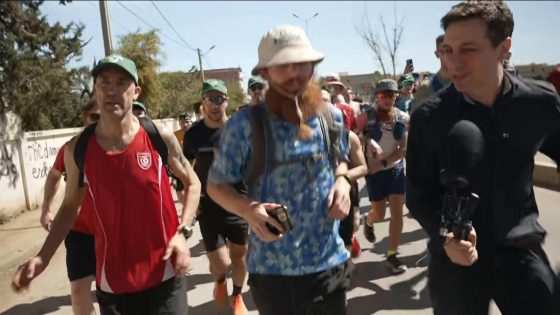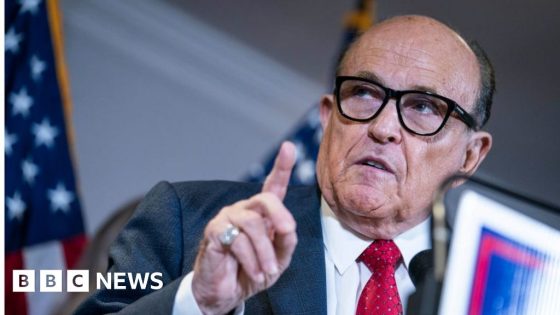O.J. Simpson, the football star, actor and pitchman whose shocking arrest for double murder and subsequent acquittal at trial shone a light on American race relations, has died. He was 76.
“On April 10th, our father, Orenthal James Simpson, succumbed to his battle with cancer,” the family said in a statement posted to Simpson’s X account.
“He was surrounded by his children and grandchildren. During this time of transition, his family asks that you please respect their wishes for privacy and grace.”
Simpson’s well-crafted public image was shattered upon his arrest days after the June 12, 1994, homicide of Nicole Brown Simpson, his ex-wife, and her friend Ronald Goldman. The pair were found slashed to death at the doorstep of her Los Angeles residence.
Simpson’s arrest and trial provided indelible moments, with an estimated 95 million Americans watching on television as the white Bronco he was being driven in was trailed by a phalanx of police cars after he failed to surrender to authorities.
Outside of Super Bowls, it was one of the top-10 most-viewed television events of all time in the U.S.
Not guilty, but liable
The case gave rise to saturated media coverage and legal punditry. Simpson’s struggle to put on gloves found at the crime scene was arguably the most notable moment of the televised trial.
Simpson’s murder acquittal on Oct. 3, 1995, delivered by a jury that after eight months of testimony deliberated for only four hours, was widely debated, with disparities in how Black and white Americans viewed the verdict.
“The jury just did not believe the police and I thought my lawyers did an excellent job of showing that evidence was planted and tampered with during my trial,” Simpson told NBC’s Today Show in 2000.
He would later be found liable for the two deaths in a $33.5 million US civil judgment.
Simpson would go to prison, in 2008, after a bizarre incident in which he organized a hotel room robbery of a sports memorabilia collector.
In a 2023 social media post, Simpson said he had experienced “COVID and cancer at the same time,” without elaborating.
In February 2024, he took to social media to deny reports he was in hospice care for prostate cancer. But his frequent posts on X soon stopped.
Starred on field, screen
Simpson rose to prominence nationally at the University of Southern California, earning the Heisman Trophy in 1968 as the top college football player in the country. The running back was soon drafted first overall in the pros, by the Buffalo Bills.
Simpson retired in 1979 while with the San Francisco 49ers, finishing with 11,236 career rushing yards, second only to Jim Brown at that time. The Juice, as he was nicknamed, set marks for rushing yards in a single game and became the first to run for over 2,000 yards in a 14-game season, earning him a spot in the Pro Football Hall of Fame in 1985.

“His runs were stunning in their beauty, ballet-like in their grace — O.J. was a symphony on the run,” said John Facenda in his narration in NFL Films footage of Simpson’s on-field highlights.
Before even entering the NFL, the charismatic Simpson began to act in TV shows. Those roles picked up in the 1970s and included turns in movie dramas Towering Inferno and Capricorn One and the landmark TV miniseries Roots. In 1988, he made the first of three Naked Gun comedy movie appearances, as hapless police officer Norberg.
Unlike Brown and Muhammad Ali, Simpson generally refrained from commenting on the race-related political and social upheavals of the 1960s and 1970s.
That made him desirable to Madison Avenue, as he became one of the most prominent Black spokespeople for everything from cars to cola. He scored endorsement deals with Chevrolet, Schick, Dingo, Foster Grant and RC Cola, with a two-decade association with Hertz showcasing him running with a briefcase through airports in a memorable TV spot,
“O.J. Simpson was the counterrevolutionary athlete,” New York-based sportswriter Robert Lipsyte said in the 2016 Oscar-winning documentary O.J.: Made in America. “O.J. made people feel good.”
Acquittal divided the nation
Simpson’s trial, and especially the acquittal at the end of it, divided America. Polls by NBC, ABC, Gallup and the Los Angeles Times revealed wide disparities. A significant majority of Black respondents agreed with the not-guilty verdict while the majority of whites said they believed Simpson was guilty.
There was more agreement about wealth, as the Gallup poll found 73 per cent agreeing that Simpson would have been convicted if he were not rich.
The Times poll found that a majority believed the jury was trying to send a message to the nation about racism and police misconduct.

The verdict landed with impact in a city where police and business owner shootings of Black citizens had gone unpunished. In 1992, 63 people were killed in the Los Angeles area, with hundreds of millions of dollars in property damage, in riots that followed the acquittal of four police officers in the videotaped beating of Rodney King, a Black man.
“I think white people have to take a new look at how aggrieved and painted the black community is about our criminal justice system,” Rev. Joseph Lowery of the Southern Christian Leadership Conference told the Associated Press after the Simpson verdict.
Prosecutors at trial focused on Simpson’s history of physical abuse and controlling behaviour in his marriage, as well as blood evidence that connected Simpson to the crime scene and the victims’ blood that was traced to his residence. Simpson’s assemblage of high-priced lawyers assailed sloppy, atypical evidence handling by police while also focusing on the racist past of one officer, Mark Fuhrman, who spotted a bloody glove at the defendant’s property.
Defiant after civil judgment
But in February 1997, a civil jury found Simpson legally responsible for the two deaths and awarded the estate of Brown Simpson and the family of Goldman $33.5 million US.
Simpson told journalist David Sheff in 2003 that the plaintiffs “don’t deserve one red cent.”
“I didn’t commit this crime,” he told Sheff in the Playboy interview. “If it means that I have to sit on my butt, or sit on a golf course, for the rest of my life and not make one extra penny, I’ll do that.”
In 2007, Simpson attached his name to the controversial book If I Did It: Confessions of the Killer, which discussed the killing in graphic detail. The rights to the book were awarded to the Goldman family by a bankruptcy court.
“We view it as close to an admission, a confession, as is humanly possible, in his words,” Fred Goldman, the father of Ron Goldman, told NBC’s Today Show.
Not long after that, Simpson became an inmate at Lovelock Correctional Center in Nevada for another case altogether. In September 2007, Simpson and five others accosted two men in a Palms Casino Resort hotel room in Las Vegas. The five-minute altercation over sports memorabilia saw a Simpson accomplice pull out a weapon.

On Oct. 3, 2008 — exactly 13 years after his murder acquittal — Simpson was convicted on all 12 charges he faced. He was sentenced to 33 years in prison, with parole eligibility after nine.
“It was my property. I didn’t see the guns brandished,” Simpson said at one parole hearing.
He was granted release in 2017, and received full parole four years later.
Vowed to find the killers
Simpson was born July 9, 1947, in San Francisco. He idolized his mother, Eunice, who supported four children largely on her own. The family spent years living in naval barracks that had been converted into public housing, and Simpson said football helped steer him away from juvenile crime.
At 19, Simpson married his high school sweetheart, Marguerite Whitley. They had three children, but the marriage ended in 1979, the same year the couple’s two-year-old daughter, Aarren, drowned in a swimming pool.
Two years before the divorce, Simpson met his second wife, Nicole Brown, who was 18 at the time, and they began dating while he was still married to Whitley. They married in 1985 and had two children before divorcing in 1992.
Simpson was arrested in 1989 on a spousal battery charge. He was alleged to have threatened to kill Nicole, according to the LAPD. Decades before #MeToo, Simpson’s work as a football broadcaster was unaffected after he received a probationary sentence.
Five years later, when he was supposed to surrender to police to face charges for killing Nicole, he failed to show up and set off a police pursuit that played out on national TV, with crowds of people gathering on overpasses to gawk or cheer on his white Bronco and news helicopters circling above.
At a news conference unfolding at the same time, Simpson friend Robert Kardashian — whose daughters would become reality TV stars years later — read a note Simpson left before taking that fateful ride that raised speculation about whether he was at risk of suicide.
“I’ve had a great life, great friends. Please think of the real O.J. and not this lost person,” the note read.
Decades later, the saga was re-examined in The People v. O.J. Simpson: American Crime Story, which saw Cuba Gooding Jr. portray Simpson, and OJ: Made in America, which won the 2017 Academy Award for best documentary.
Simpson, meanwhile continued to maintain the innocence he proclaimed immediately after his acquittal when he said he would “pursue as my primary goal in life the killer or killers who slaughtered Nicole and Mr. Goldman.”
But as he moved from California to Florida and Nevada, he was increasingly involved in less noble pursuits, including releasing a rap video and selling a Candid Camera-style video in which he appeared in various disguises.
Source Agencies



